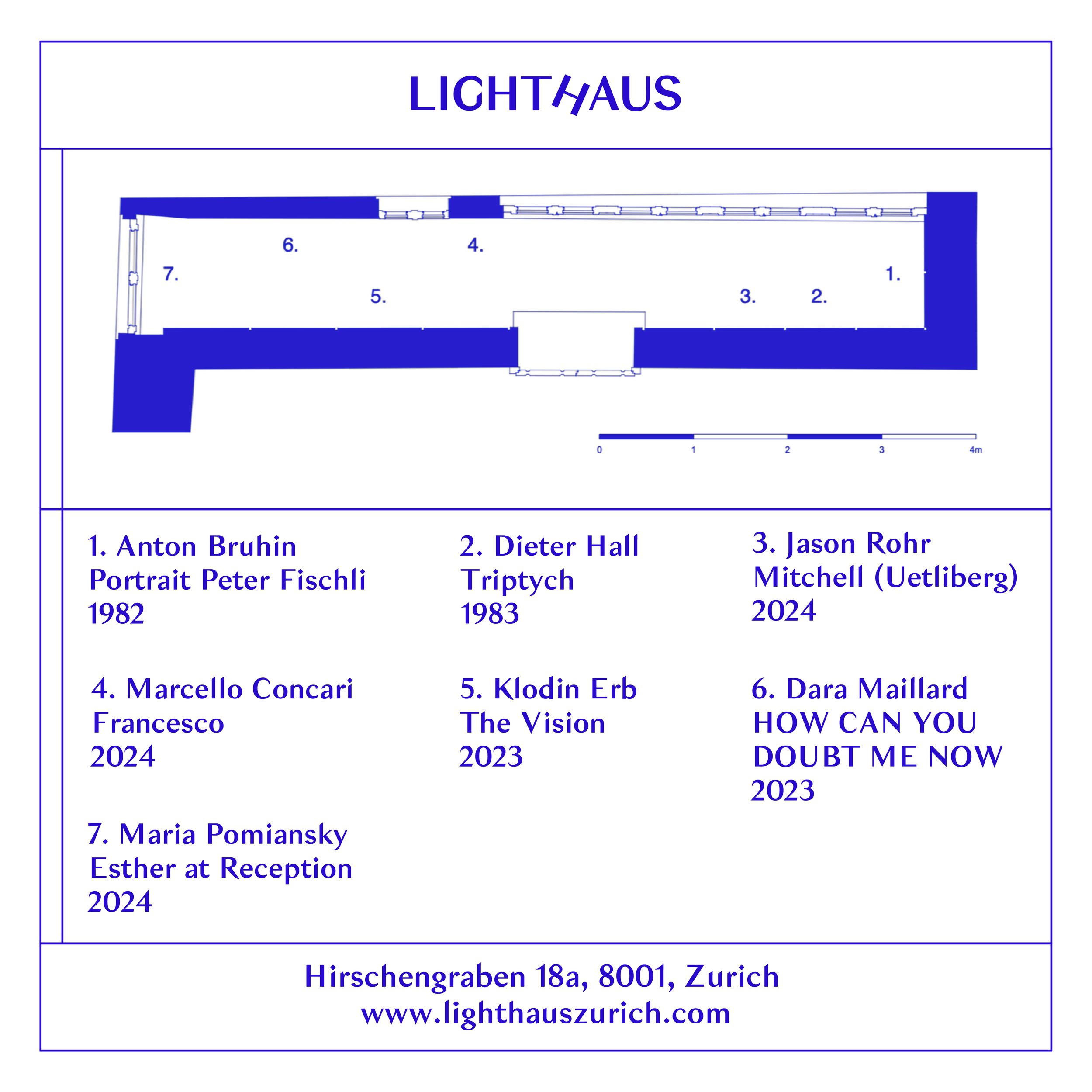Portraits by Seven
Anton Bruhin, Dara Millard, Dieter Hall, Jason Rohr, Klodin Erb, Marcello Concari, Maria Pomiansky
13 January - 24 February, 2024
What can be found in a room dedicated to faces? This exhibition invites seven artists to present work that mirrors their artistic journeys and depicts people of note along the way. Through this dense presentation of work, we explore the interpretations of narrative through relationships of some form or another.
Anton Bruhin (1949, Lachen) is a painter, draughtsman, sculptor, poet, musician, and tinkerer; he is a universal artist. His expansive work doesn’t care for fashion or trends and could be comparable to childish creativity, the artist does not limit himself by what is already there, but allows things to emerge from the things themselves. In the 80’s his focus was painting, especially paintings en plein air as well as portraits of friends and acquaintances. When painting his Portrait of Peter Fischli, he remembers Lovis Corinth's advice not to worry about the correct depiction of the hands. “A finger salad does absolutely no harm.”
Dara Maillard’s (2002, Sofia) work combines various timelines and cultural contents in the form of figurative painting, often reappropriating historical female archetypes. These works serve as a lens through which to examine the heritage that has shaped the present-day European female collective psyche. Dara’s ‘metal painting,’ which fuses elements of painting and sculpture, depicts Anna Goldi and Barbara Zdunk, believed to be the last witches executed in Europe, linking this dark chapter of history to contemporary realities of violence on the female body.
Dieter Hall (1955, Zurich) has been working as a painter of many genres, although he has worked exclusively within the wide range of figurative art throughout his life. He has concentrated on portrait painting, featuring models who are mainly friends or people within his close circle. The work on display features Julius Eastman, a composer, singer, and pianist who affected the artist's life through his enormous genius. In 1983, Julius Eastman visited Dieter Hall in Zurich.
Jason Rohr’s (1999, Hausen) work embodies shortcomings of contemporary art without reducing them to minimal, conceptual statements. Through his practice, Jason explores how technologies address recurring cultural patterns. Using this portrait of Mitchell as an alibi, figurative painting tilts into being a servant of the conceptual. The viewer cannot be found in the reflective nature of this work, the only real reflective layer being the exchange between the artist and Mitchell.
Klodin Erb (1963, Winterthur) is an artist who’s core medium is painting. She samples art historical references with motifs from the contemporary world and tailors her techniques to her topic, highlighting and interweaving form and content to maximize the expressive power of painting. As a careful observer of her surroundings, her interest lies in the observation of how our social structures change and the challenges we encounter in the here and now. The Vision combines all of this: a wide variety of painting styles with borrowings from famous role models such as Rembrandt van Rijn, Marlene Dumas or Maria Lassnig, as well as contemporary themes ranging from gender fluidity to the humanoid. Everything is in a state of flux in order to move forward.
Marcello Concari’s (1988, Fiorenzuola d’Arda) paintings explore the physicality of desire, often featuring objects that reflect the zeitgeist of club culture such as shiny leather sofas and iridescent light. The work he has contributed to this exhibition is a rarity, as the human figure does not usually appear. The face works with the artist's style but is left open to interpretation, asking questions about identity.
Maria Pomiansky (1971, Moscow) works on paper and oil painting, experimenting with color and form, and is interested in all aspects of the contemporary urban space, which document and reflect reality. Maria Pomiansky does not forget the classic oil portrait. For this exhibition, she presents a major figure of the contemporary scene in Zurich, Esther Epstein, who is also a close friend and frequent model to the artist. The artist's approach differs from the ceremonial portraits of the past, embracing a new quick and expressive approach to represent a more intimate nature and shows the mood of the current moment.








